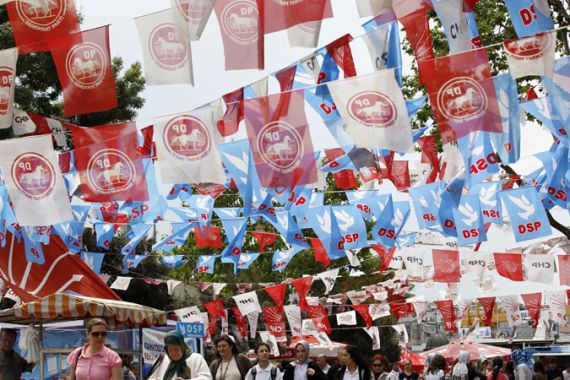Turkish election campaign enters final hours
Party leaders make final pitches to voters ahead of parliamentary vote with crucial consequences for country’s future.

 |
| Fifteen parties are fielding candidates in Sunday’s election [Reuters] |
The leaders of Turkey’s political parties have staged their final rallies before the country goes to the polls on Sunday in parliamentary elections with crucial consequences for the nation’s future.
Recep Tayyip Erdogan, the incumbent prime minister, whose Justice and Development Party (AKP) is widely expected to win a third term in office, addressed supporters on Friday in the eastern cities of Erzurum and Agri.
Erdogan urged them to deliver an AKP majority in return for “further democracy, fundamental rights and freedoms”.
He was expected to return to Ankara, the capital,before travelling on Saturday to his home city of Istanbul, where he is standing as a deputy.
Kemal Kilicdaroglu, the leader of the main opposition Republican People’s Party (CHP), urged voters to “teach the AKP a lesson” as he spoke to supporters in the Black Sea province of Artvin, as well as in Ankara and Denizli.
Nationalist Movement Party (MHP) leader Devlet Bahceli addressed rallies in Kahramanmaras and Gaziantep in the southeast of the country, the Today‘s Zaman newspaper reported.
 |
Erdogan has pledged to draft a new constitution that he says would enhance individual freedoms and make Turkey more democratic, if he secures a large enough majority to do so.
But his opponents accuse the ruling party, which mixes economic liberalism with Islamic-rooted social conservatism, of seeking to consolidate their grip on power.
They say that a new constitution should be agreed in concert with all parties and with the country at large. Kilicdaroglu has accused the AKP of “despotic ambitions”.
Erdogan’s party, in power since 2002, is credited by many with steering Turkey through an unprecedented decade of economic prosperity, with raising the country’s international profile, and with curbing the powers of the country’s once-dominant secular establishment.
Erdogan has called on voters to give his party 367 deputies in the new parliament, a two-thirds super-majority that would enable the AKP to rewrite the constitution unilaterally.
But opponents say any attempt to introduce a new constitution without proper consultation would polarize the country.
Minority rights
Kilicdaroglu has attempted to extend the electoral reach of the CHP beyond its traditional secular support base by reaching out to poorer citizens, with measures such as an improved welfare system, and by offering more rights for minorities, such as Kurds and Alevis.
| Turkish Elections: Party list |
|
Fifteen parties will field candidates in Sunday’s elections, according to Turkish electoral authorities. Independent candidates, notably those representing the pro-Kurdish Peace and Development Party (BDP) will also stand in many areas. |
Candidates from 15 parties, as well as many independent candidates, are standing for election to Turkey’s 550-seat parliament in provinces across the country.
But parties need to win at least a 10 per cent share of the national vote to be elected to parliament.
Independent candidates, such as those representing the pro-Kurdish Peace and Democracy Party (BDP), need only to achieve a 10 per cent share in the province which they hope to represent.
Dursun Atalay, a tourism worker in Istanbul, told Al Jazeera’s Ayse Alibeyoglu that he would cast his vote for the AKP.
“Things are much better now, the roads are in a better condition, and Istanbul is in a better condition,” Atalay told Al Jazeera.
“No one can deny this; at least AKP is working to make our lives easier.
“They prove to me that they are doing their job, they are working hard, and Erdogan is the right man for the job.
“Everyone is happy with the way things are going under the AKP. I don’t know why anyone wouldn’t vote for the AKP.”
‘Two-faced’
But Mehmet Unal, a campaign worker for the BDP, said that Erdogan had not kept his word in regard to his pledge to grant greater rights to Turkey’s Kurds in the last elections four years ago.
“He promised the Kurds peace and democracy, then he backtracked on everything he said after winning the election with Kurdish support,” said Unal.
“Erdogan is two-faced. He says one thing in Izmir [in the west of the country, another in Diyarbakir [in the Kurdish southeast].”
Erdogan has struck an increasingly nationalist tone during the present campaign, in an apparent attempt to win voters at the expense of the ultra-nationalist MHP.
In a television interview on Thursday, answering allegations made by MHP leader Bahceli that the AKP was negotiating the release of jailed Kurdish separatist leader Abdullah Ocalan, Erdogan said his party would have executed Ocalan if it had been in power when he was captured in 1999.
The buildup to Sunday’s vote has also been patially overshadowed by events on Turkey’s southern border, where thousands of refugees fleeing a violent crackdown in neighbouring Syria have sought safety on the Turkish side of the frontier.
Political campaigning must end by 6 pm local time (1500 GMT) on Saturday, according to Turkish election law.
More than 50 million people are eligible to vote in Sunday’s election.
